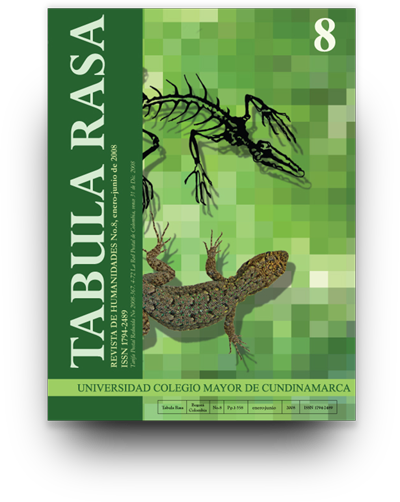Returning the Ball to the Field: Dialogues with Walter Mignolo
Devolviendo el balón a la cancha. Diálogos con Walter Mignolo
Show authors biography
This article originated with discussions maintained with Walter D. Mignolo during the summer course titled “Decolonial thought and the surge of indigenous peoples as new political subjects in Latin America,” held at El Escorial between the 24th and 28th of July, 2006. Our primary objective is to continue the debate, organizing and systematizing large part of the arguments that opposed Walter’s thesis, to try to present a group of questions and arguments around the notion of epistemic turn. Our second objective is to provide elements that can be used to create a liberating theoretical cartography that allows articulating and relating the fights and processes of collective action of the attacked subaltern subjectivities in different areas of the planet by the dynamics of domination and exploitation of capitalist modernity, as well as overcoming the euro-centric defects of a large part of the emancipating thought traditions of classic anti-systemic movements. In third place, we ask ourselves the question with which professor Heriberto Cairo opened the course: It is possible to decolonize Europe? We will thus inquire about the possibility of a communication interface between the movements in Latin America and Europe, and about the radiation of indigenous political cultures outside of their range of immediate insertion.
Article visits 60 | PDF visits 42
Downloads
Barabás, A. M. 2000. «La construcción del indio como bárbaro: de la etnografía al indigenismo». Revista Alteridades 10:9-20.
Bengoa, J. 2000. La emergencia indígena en América Latina. Santiago de Chile: Fondo de Cultura Económica.
Berardi, F. 2003. La fábrica de la infelicidad. Nuevas formas de trabajo y movimento global. Madrid: Traficantes de sueños.
Blackburn, R. 1988. The Overthrow of Colonial Slavery, 1776-1848. Londres: Verso.
Blyden, E.W. 1967. Christianity, Islam and the Negro Race. Edimburgo: Edinburgh University Press.
Bonfil, G. 1986. Identidad, pluralismo y cultura en América Latina. Buenos Aires: CEHASS, Universidad de Puerto Rico.
Cairo, Heriberto 2006. «Pensamiento des-colonial y proyectos políticos des-coloniales de indígenas y afrolatinos en América Latina/Abya Yala: genealogía, problemas y bases para la interfecundación». Ponencia presentada en el Curso «El pensamiento des-colonial y el surgimiento de los indígenas como nuevo sujeto político», San Lorenzo del Escorial, 24 al 28 de julio de 2006.
Cairo, H. y Pastor, J. (Comps.) 2006. Geopolítica, guerras y resistencias. Madrid: Trama editorial.
Capella, J. R. 1993. Los ciudadanos siervos. Madrid: Trotta.
Caravantes, C. M. 1992. «El katarismo en Bolivia, hoy», en P. García Jordán (coord.), Conquista y resistencia en la Historia de América. Barcelona: Publicacions i Edicions de la Universitat de Barcelona.
Ceceña, A. E. 1996. «Universalidad de la lucha zapatista. Algunas hipótesis», Revista Chiapas 2.
Cugoano, O. [1787] 1999. Thoughts and Sentiments on the Evil of Slavery. Londres: Penguin.
Errejón, I.con Iglesias, P., y Pecorelli, V. 2006. “A summit without anti-summit, hegemony without dissent. Counterinsurgent strategies developed on the 2005 G8 summit in Gleneagles”, en C. Baker y Tyldesley (eds.) Alternative Futures and Popular Protest. Conference Papers Volume II. Manchester, Metropolitan University
Escobar, A. 2003. «Mundos y conocimientos de otro modo». Tabula Rasa1:51-86.
Escobar, A. 1999. El final del salvaje. Naturaleza, cultura y política en la antropología contemporánea. Bogotá: Instituto Colombiano de Antropología e Historia-CEREC.
EZLN 2005. Sexta Declaración de la Selva Lacandona. Obtenido el 12 de Septiembre de 2006, en http://www.ezln.org/documentos/2005/sexta.es.htm revisado
Fanon, F. [1961] 1974. Los condenados de la tierra. Buenos Aires: Fondo de Cultura Económica.
Fontana, J. [1994] 2000. Europa ante el espejo. Barcelona: Crítica.
Galeano, Eduardo. 1999. Las venas abiertas de América Latina. Montevideo: Ediciones del Chanchito.
García Linera, A. 2006. «Autonomías indígenas y Estado multicultural. Una lectura de la descentralización regional a partir de las identidades culturales», obtenido el 10 de septiembre de 2006, en www.descentralizacion.org.bo/dat/sitio/propuestas/166_ propuesta_garcialinera.pdf.
García Linera, A. 2005. «El desencuentro de dos razones revolucionarias. Indianismo y marxismo». Revista Barataria 2:4-14
Hardt, M. y Negri, A. 2004. Multitud. Guerra y Democracia en la era del Imperio. Barcelona: Debate.
Hardt, M.y Negri, A. 2002. Imperio. Barcelona: Paidós.
Hernández Navarro, L. 2000. «Zapatismo: la interacción del color». [Versión electrónica] Revista Chiapas 9. Obtenido el 9 de diciembre de 2006, enhttp://www.ezln.org/ revistachiapas/No9/ch9hernandez.html.
Hurtado, J. 1986. El katarismo. La Paz: Hisbol.
Iglesias Turrión, P. 2004. «Los indios que invadieron Europa. La influencia del E.Z.L.N. en las formas de acción colectiva de los movimientos globales. Los tute bianche». Ponencia presentada en el X Encuentro de latinoamericanistas españoles. (Disponible en: http://www. sindominio.net/~pablo/papers_propios/Los_Indios_que_invadieron_Europa.pdf).
Laclau, Ernesto. 1971. “Feudalism and Capitalism in Latin America”. New Left Review I(67):19-38.
López y Rivas, G. [1995] 1996. Los pueblos indios en el neoliberalismo. México: Plaza y Valdés.
Martin, William. 2005a. “Introduction. Recapturing Black Worlds in Postliberal Times”. FBC Review XXVIII(1): 1-6.
Martin, W. 2005b. “Global Movements Before “Globalization”: Black Movements as World-Historical Movements”. FBC Review XXVIII(1): 7-28.




